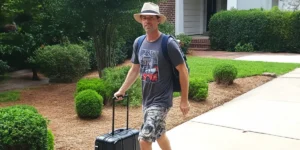
I was at work when the call came. My stomach dropped as I answered. Mom was gone. One moment she was fighting a lung infection; the next, nothing made sense.
I don’t remember driving home. One minute I was at my desk, the next I was fumbling with my house keys, tears blurring my vision. John’s car was in the driveway.
“John?” My voice echoed through the house. “I need you.”
He appeared in the kitchen doorway, coffee mug in hand, slightly annoyed. “What’s wrong? You look terrible.”
Words stuck in my throat. I shook my head and held out my arms. He gave me an awkward pat on the back, like I was a stranger’s child.

“My mom… she died,” I finally managed.
“Oh. Wow. I’m sorry, honey.” He pulled back. “Want me to order takeout tonight?”
Numbly, I nodded. Mom was gone—the woman who taught me to ride a bike, who worked two jobs to put me through college, who called every Sunday.
The next morning, reality hit. I had to plan the funeral, notify family, sort through her belongings. I remembered our upcoming vacation.
“John, we need to cancel Hawaii,” I said, looking up from my phone. “The funeral will be next week.”
“Cancel?” He frowned, folding his newspaper. “Those tickets are non-refundable. We’d lose thousands. Plus, I’ve already scheduled tee times.”
“John, my mother just died!”
He wouldn’t meet my eyes, suddenly interested in straightening his tie. “Look, I know you’re upset, but funerals are for family. I’m just your husband—no one will miss me.”
His words hit me like a physical blow. I realized how little he understood me.
The week passed in a blur of tears. John occasionally offered suggestions like, “Maybe you should take a sleeping pill,” or “Have you tried a comedy?”
The day before the funeral, he left for Hawaii with a quick peck on my cheek and a “Text me if you need anything!”
I buried my mother on a rainy Thursday, while John posted Instagram stories of sunset cocktails.
That night, surrounded by sympathy casseroles I couldn’t eat, something snapped inside me. I had spent years making excuses for John’s emotional distance, telling myself he showed love in other ways. But what ways? Buying gifts to avoid real conversations?
I called my friend Sarah. “List our house. Online only, open house tomorrow. And mention the car comes with it.”
“John’s baby? He’ll flip!”
“That’s the idea,” I replied. “He loves that car more than me.”
The next morning, potential buyers arrived. I sat sipping coffee, watching as they circled John’s precious Porsche.
When John’s Uber pulled up, I smiled. Game time.
“Edith! Why are there people by my car?” he shouted, face red.
“Oh, that. I’m selling the house. The car’s a great selling point,” I replied.
“Selling the—” He yanked out his phone. “I’ll call Sarah!”
“Go ahead,” I said sweetly. “Tell her about your vacation. How was the beach?”
Realization dawned on his face. “Is this some kind of punishment?”
“I’m just looking out for number one,” I said. “After all, I’m just your wife. Not family, remember?”
The next hour was chaos. John ran around shooing away buyers while begging me to reconsider. I let him stew until Sarah texted she was running out of friends to send over.
“Fine,” I announced. “I won’t sell the house… or the car.”
John sagged with relief. “Thank God. I—”
I held up a hand. “But things will change. I lost my mother, and you couldn’t even reschedule a vacation. I needed you.”
He looked ashamed. “I didn’t think—”
“No, you didn’t. But you will start. Because next time, it won’t be a fake listing.”
He nodded like a scolded schoolboy. “What can I do to make it right?”
“Act like a partner instead of a roommate. I need time to grieve. Real grief, not the kind you can fix with dinner or jewelry.”
“I love you and want to try,” he said.
Things aren’t perfect, but John goes to therapy now. Last week, he actually asked how I felt about Mom. He listened as I talked about missing her calls and reaching for the phone to tell her something funny before remembering I can’t.
Sometimes I think about what Mom would say about all this. I can almost hear her laugh: “That’s my girl. Show ‘em the ‘For Sale’ sign instead.”
She taught me that strength comes in many forms—sometimes it’s pushing through pain, and sometimes it’s knowing when to push back.





